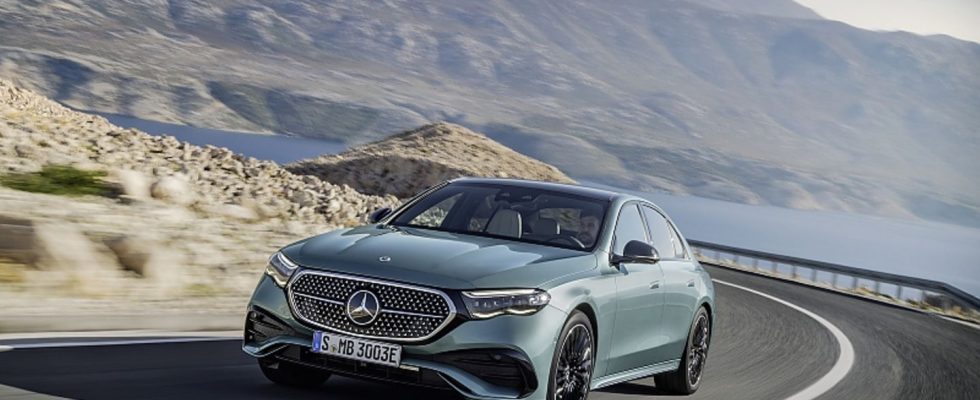Technology: Sustainable interiors
Ecological and comfortable
Mercedes E Class 2024
© press-inform – the press office
More and more car manufacturers from the volume segments are doing without animal skins in their models; the noble material for seats and linings is indispensable, especially in the higher vehicle segments. It’s still sustainable.
The recycling percentage of cars is increasing every year. This not only includes steel and aluminum for the platform or body, plastics and the supply chain, but more than ever also the entire interior. Some companies rely on leather for noble vehicles in the premium league; Others are replacing or supplementing this with sustainable plastics, especially in the case of electric vehicles. Polestar, for example, gives its customers a choice with the chic Polestar 4, as does Audi with its Etron GT electric model or BMW with its new i5 / 5 Series. Like the other luxury manufacturers from Europe, Porsche is also sticking to leather seats. However, like the other brands in the Volkswagen Group, the people in Stuttgart attach particular importance to the fact that the animal skins are produced sustainably. Porsche therefore joins the Leather Working Group together with the other brands of the VW Group. The non-profit organization based in Milton Keynes, UK, is committed to transparency and uniform environmental standards in the leather supply chain. Over the past few years, the Leather Working Group has certified more than 2,000 member companies; that’s 25 percent of the world’s finished leather production. The members themselves come from all areas of the value chain, from tanneries to leather processing industries and associations to dealers and buyers.
Ecological and comfortable
“Leather is a quality feature for Porsche customers. Together with our suppliers, we are committed to internationally accepted standards. The facilities in which our leather is manufactured are also important. They should receive certification from the LWG,” says Barbara Frenkel, Head of Procurement at Porsche. Just like the other car manufacturers, the Volkswagen brands are committed to sustainability and transparency in the supply chain. At the beginning of 2022, Porsche created material-specific specifications for leather, which all suppliers have had to comply with since then. Among other things, the country of origin of the raw material must be disclosed and the companies must guarantee maximum animal welfare and responsible leather production. “With supply chain traceability, companies can ensure they are sourcing leather in a responsible manner. This is at the core of our efforts,” says Christina Trautmann, head of the Leather Working Group. “We look forward to the active participation of Porsche and the brands of the Volkswagen Group. With their support, we want to advance the development of tools and methods that can have a positive impact on the leather industry.”
Car supplier Faurecia shows that it is also possible without leather. The interior sector has developed a car seat of the near future that is more sustainable than ever. The highlight of the new Faurecia seat is its modular structure, because instead of a very large number of components, the automotive seat consists of an unusually small number. If modern comfort seats with details such as massage function, heating, ventilation and, of course, electrical adjustment including memory have up to 120 modules, the newly developed Faurecia seat has just ten of them. More importantly, these ten modules are adaptable to almost any vehicle manufacturer and almost any seat frame platform. This means that several car models can be covered with significantly lower upfront costs.
When it comes to costs, it is also about durability and thus the increasingly important aspect of sustainability, because the modular architecture extends the life of the seat and replacing it allows individual modules to be recycled. The new modular seat makes it easy to replace parts such as covers and cushions or to upgrade with functions such as massage, lumbar support, sensors, sound experience and other comfort modules over the entire lifespan of the seat in several vehicle generations. The first series use is planned for 2025. As a supplier, Faurecia is currently still keeping a low profile about the manufacturer for the first use.
This sustainable approach reduces the carbon footprint of automotive seats by streamlining design and using less material. In addition, the materials are more sustainable than before, because the components are recycled, reused or come from organic farming. In addition, the mixture of materials ensures simplified recycling and simpler assembly/disassembly of the seats, through to the concentration of module production in regional centers in order to assemble the seat as close as possible to the vehicle’s production site. All of this ultimately results in 55 percent less CO2 emissions and up to 40 percent more recycled content than a conventionally produced car seat.
The new plastics Auraloop and Ecorium are used in the vehicle seats. Auraloop was jointly developed by Faurecia and Indorama Ventures, a world leader in the manufacture and recycling of PET, to replace the well-known foams used in car seats. Composed of a purely recyclable structure of polyester-based fibers, Auraloop cuts in half the carbon footprint of car seat cushions currently made from polyurethane foam. It also brings advantages in terms of thermal comfort and durability. The open fiber structure of Auraloops as well as the increased air permeability compared to normal upholstery solutions improves the breathability of the seats, which enables better thermal regulation of the occupants. Ecorium is a synthetic material developed by Faurecia to complement genuine and synthetic leather with a low carbon footprint, which is to be installed in the first production models from the compact to the premium class from the end of the year. The material can be used as an alternative to animal or artificial leather not only in seats, but also for panels, surfaces, instrument panels or consoles.

